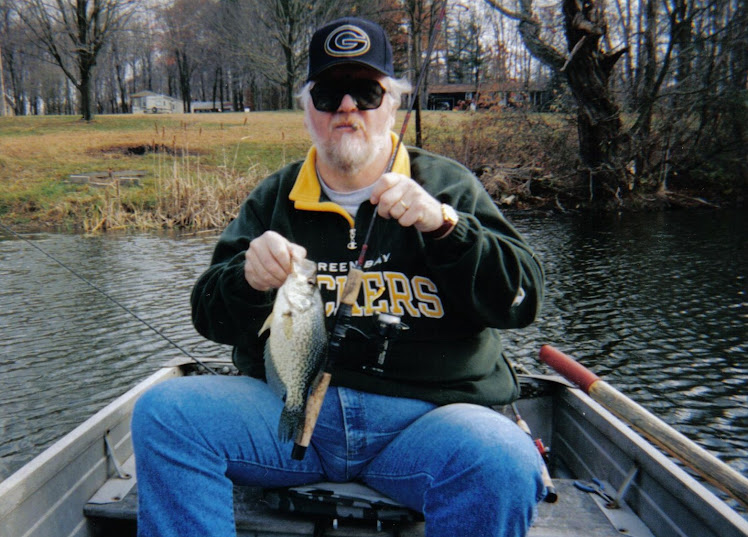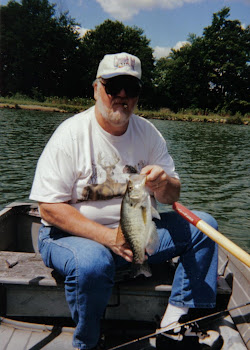In the last segment I talked about the importance of maintaining your live well. Now, I want to talk about the physical handling of your fish. Fish are sensitive creatures and great care should be practiced while handling them! When you catch a fish, the first thing to do before handling the fish is to wet your hands. The fish have a protective coating or "slime" on their scales and skin to aid in fighting infections and deseases. By wetting your hands, this will help in keeping this slime from being removed! Care must be taken with lifting the fish. A fish that is too large to be properly supported in one hand, if held horizontially, needs to be supported at the tail or stomach area. If held vertically, holding by the lower jaw such as a Bass is an acceptable method. You can break the jaw of a fish if the body is not supported! When releasing the fish, just don't "THROW" it back in. Gently lower it back to the water and then release it. If the fish put up a stuggle before landing, take the time to hold the fish in the water and gently work it back and forth to help it recover it's strength and breathing! The fish should swim out of your hand(s) when ready to go!
If you happen to hook a fish deep in the mouth, use extreme caution in removing the hooks. The area around the gills is a super sensitive area and will bleed very easy. If you cann't get the hook out, it is better to cut the hook or the line before releasing the fish. The hook will disolve in a short time with little damage done to the fish! If all else fails, this should be a fish for the frying pan!
Careful handling of fish and a good release will help insure a better fishing experience in the future!
This blog will be about some of my fishing adventures while growing up in Ohio. Included will be fishing tips,how to advise,things not to do and in general, just having fun while fishing!
Fall Crappie

Me with a nice Black Crappie and Cigar
Late Summer Crappie

Me with a nice White crappie and Cigar
Thursday, September 30, 2010
TAKING CARE OF YOUR FISH AFTER THEY ARE CAUGHT
I am a strong believer in "CATCH & RELEASE" of your fish. This does not mean that you cann't take some home for the table but use common sense and limit your take home amount! Releasing larger fish will help to establish a good population of larger fish in the future! Now, having said all of that, there will be times when fish will be kept in a live well for a weight-in during a tournament or until the end of your day! To ensure the health of your fish so they can be released, after you win the big prize, takes some care and planning before you catch a fish.
The first thing to know is the capacity of your live well. This can be determined (if you do not already know) by filling your well with water to full capacity, then using a measuring device, measure the depth of the water in inches, then the width of your live well, then the length of the well. You then want to convert the inch measurement to feet by dividing each measurment by 12. when you have the three measurements converted, multiply them together then multiply this number by the constant of 7.5, this will equal the capacity in gallons of your live well.
There are additives for the live wells to help protect the fish. Three of which are produced by SURE LIFE LABORATORIES. These are "CATCH AND RELEASE", "PLEASE RELEASE ME" and "FORM". More information on these products can be found by going to their web site at www.surelife.com and can be purchased through BASS PRO SHOPS.
DOUG HANNON, A.K.A. "THE BASS PROFESSOR", recommends using HYDROGEN PEROXIDE to increase the oxygen content of the water in the well. Hydrogen peroxide has similar chemical make up as water only 1 part more of oxygen then water. You only want to add 1 ounce of hydrogen peroxide to 3 gallons of water again, you must know the capacity of your live well!
The water temperature of the well should never exceed 65 degrees and needs to be checked on a regular basis. You can add ice to bring the temperature down but be aware that most tap water will contain Chloride which will kill the fish! The "CATCH AND RELEASE" product mentioned above will absorb the chloride there by not harming the fish! Another idea is to take water from the source you will be fishing, and freeze it in small plastic water bottles or ice cube trays. This way you will illiminate any chloride from getting into the well! More to follow!
The first thing to know is the capacity of your live well. This can be determined (if you do not already know) by filling your well with water to full capacity, then using a measuring device, measure the depth of the water in inches, then the width of your live well, then the length of the well. You then want to convert the inch measurement to feet by dividing each measurment by 12. when you have the three measurements converted, multiply them together then multiply this number by the constant of 7.5, this will equal the capacity in gallons of your live well.
There are additives for the live wells to help protect the fish. Three of which are produced by SURE LIFE LABORATORIES. These are "CATCH AND RELEASE", "PLEASE RELEASE ME" and "FORM". More information on these products can be found by going to their web site at www.surelife.com and can be purchased through BASS PRO SHOPS.
DOUG HANNON, A.K.A. "THE BASS PROFESSOR", recommends using HYDROGEN PEROXIDE to increase the oxygen content of the water in the well. Hydrogen peroxide has similar chemical make up as water only 1 part more of oxygen then water. You only want to add 1 ounce of hydrogen peroxide to 3 gallons of water again, you must know the capacity of your live well!
The water temperature of the well should never exceed 65 degrees and needs to be checked on a regular basis. You can add ice to bring the temperature down but be aware that most tap water will contain Chloride which will kill the fish! The "CATCH AND RELEASE" product mentioned above will absorb the chloride there by not harming the fish! Another idea is to take water from the source you will be fishing, and freeze it in small plastic water bottles or ice cube trays. This way you will illiminate any chloride from getting into the well! More to follow!
Subscribe to:
Comments (Atom)